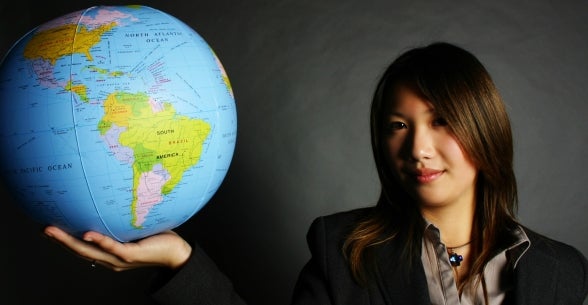
The Current Pandemic is a Reflection of Our Own Business Model
03/25/20
By Mark Esposito, Clinical Professor of Global Shifts and the Fourth Industrial Revolution
These days are filled with mixed emotions as we navigate, many of us, the unprecedented tempo of a time which seems to have suspended for something so mystique and cryptic that we can't even see. This pandemic, which has, for the first time across at least five generations, paralyzed large parts of our modern world, has caught us off guard. In some countries, and I am thinking of the native land of my father, Italy, the detection went from patient 1 to patient 50.000 over just 30 days. The speed that has characterized this pandemic is close only to some of the most catastrophic Hollywood movies, to say the least, where special effects and end of the world scenarios are produced by powerful visual programming. But reality this time has outperformed and outsmarted the most creative producer of drama, as we see it announced on daily headlines, scrolling under our eyes, on the overly touched screens of our smartphone, today's most reliable connector to a sense of quasi lost normalcy, of what we used to be when crossing borders and individual freedoms were givens to many of us.
So as many of us move into any hypothetical curve of denial and anger, we may wonder where all of this is coming from, and unnecessary and inconclusive remarks against China are perpetrated daily, like we needed a scapegoat to feel better at an indispensable sense of blame, almost like a form of self-help therapy, aimed at alleviating this sense of suffocation and confusion. But this situation, as grave and hefty as it is, is a powerful reminder of the kind of society we have become: an interconnected and interdependent maze of suppliers across the globe, which have erected in the last three decades, the foundations of our global supply chain. From our diet and our products to the common and daily behaviors overconsumption, we are nothing more -and no minimization is intended- than a reflection of the business model that governs society these days.
So what is the connection with the current pandemic?
Well, it is our modernization and our predatory demeanor against the planet that has exposed us more and more to being confronted with wildlife we have never been exposed to before. It is the increasing temperature of the planet that triggers new biodiversity equilibria unknown to us, but entropic to Mother Earth. It is the rise of a growing middle class, more and more demanding of a sophisticated diet, that has exasperated the rise of animal farming for human consumption, stretching our agriculture capacity beyond the reasonable boundary we should honor, if we were to entail it within the possibilities of the planet, rather than measured against the demands of a perpetually distributed model of growth, as determined by our macroeconomic indicators. And it is this bipolar/tripolar or multipolar inequality plague of ours, where tangible and intangible resources are so poorly and so unevenly distributed, that exacerbates, even more, our response mechanisms to what could be a required global response to global challenges, unfortunately, left to national governments to address, rather than by super partes entities, mandated to address the nature of the 21st-century annoyances, which all look and taste of global and blended nature.
So this coronavirus is nothing more than an unintended selfie of what we have become and how we have underplayed the risks of increased complexity in a system that has abandoned linear and structured models, to become an interconnected network of actors, all capable of bearing information, value and equally disruption. This pandemic is an unintended consequence of a system that, by converging, has enhanced the systemic risk of an integrated multivariable architecture, very fluid, dynamic, and resilient in its own way.
So while this article doesn't want to undermine the fact that an effective response mechanism must be put in place now as the virus hits its most critical days and as we need to cope with a near-collapsed health care capacity, any effort we will make now will be going into two mutually exclusive directions:
- Remedies and solutions (option 1) reinforcing an architecture of public health still strongly grounded on industrial models of predictions and linear distribution, which were erected in the 20th century as part of the modernization of society as a consequence of the end of WWII and the consequent rise of free markets driven by industrial production. This system was designed when health care catered to a smaller proportion of the population, and when life expectancy was much lower.
- Remedies and solutions (option 2) that will foster the rise of a new archetypical structure of reference, built around global cooperation, multilateralism of the medical and pharma supply chain and aimed at building real and preventative capacity around the world, by redistributing, through generative mechanisms, an appropriate number of medical staff and devices that will engage on more equitable access to public health across regions, coupled by global cooperation and cross-functionality of the available resources. As a bottom-line, the public health care gap around the world must be closed and reinvested in light of the new needs.
We are in dire need of a change of narrative on public health as we have lived on a stock of interventions designed for a different world and for a different sense of what life was meant to be. Today as we face one of the most aggravating global crisis of our time, we should not forget that Covid-19 is nothing more than a direct and (dis)proportional event of our era and it is just the beginning of a series of global events that are unintentionally doomed to break our fragile structures under the weight of a powerful new normal. This new normal will be debilitating if we deal with any future challenge as individual nation-states, or it can become fortifying and resilient if we shift our thinking that global problems require 'global and globally' orchestrated responses. The way forward can only be prescribed in the convergence of our soul as a civilization, if we still want the sun to rise, with us alongside...tomorrow.



